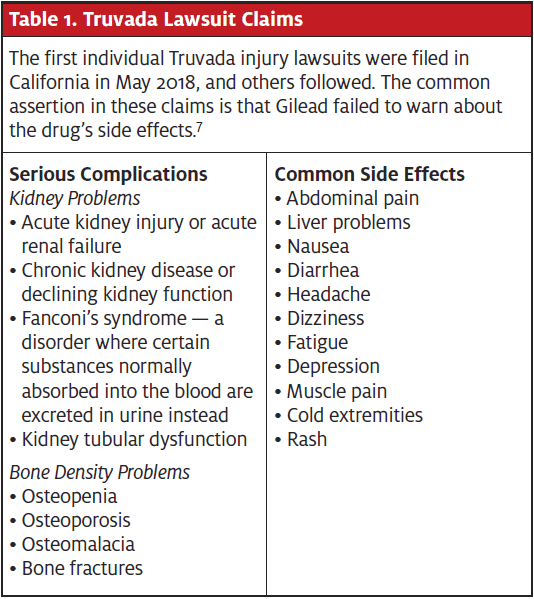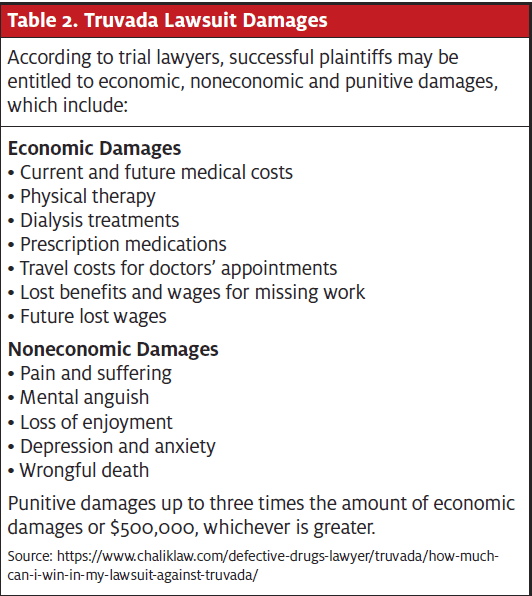Urgent message: Urgent care providers should take note of emerging class-action lawsuits when helping patients decide if PrEP (pre-exposure prophylaxis for HIV) is right for them.
Alan A. Ayers, MBA, MAcc is Chief Executive Officer of Velocity Urgent Care
Few diseases ravage the body like HIV. As such, the healthcare world has been working for decades to develop treatments and methods to protect patients against it.
One of the most promising treatments is pre-exposure prophylaxis (PrEP), which was approved by the FDA in 2012 as a way to prevent HIV infections in high-risk patients. The brand-name drug Truvada has become well known in the medical field since then.
This has become a gray area for urgent care, however.1 Some providers believe that urgent care centers are the perfect place to initiate PrEP treatment due to their contact with vulnerable individuals and their high frequency of STI treatment. Others contest that the episodic nature of urgent care doesn’t provide adequate opportunity for the frequent monitoring and management needed by patients undergoing PrEP treatment, making PrEP more appropriate for “primary care.”
Further, issues like nonadherence and increased risk behaviors can lead to negative health outcomes for patients taking PrEP drugs if they are not carefully monitored.
Recently, an increasing number of lawsuits regarding PrEP medications have started popping up. Law firms are filing class-action suits against Gilead, the maker of Truvada, regarding the serious side effects of the medication. Many are using aggressive marketing campaigns and scare tactics to recruit new plaintiffs. Whether or not these lawsuits are valid or will hold up in court remains to be seen. However, they are something to consider for urgent care owner/operators who are looking to make decisions about offering PrEP treatment in their clinics.
Before breaking down the trending lawsuits, it’s important to understand a bit more about PrEP treatment and how it works.
What Is PrEP?
As it stands today, there is no cure for HIV, the virus that causes AIDS. Once a patient is diagnosed with HIV, they will deal with the infection for the rest of their life. Although medical management of HIV has improved greatly in the past few decades, prevention is still key.
PrEP treatment—proactive taking of antiretroviral drug—has been suggested for those who aren’t currently infected with HIV but whose behaviors put them at higher risk of being exposed to the virus. For instance, HIV-negative individuals having sex with an HIV-positive partner are prime candidates. Gay or bisexual men who engage in condomless sex with multiple partners, sex workers, and intravenous drug users may also be candidates.
PrEP medications like Truvada are taken in pill form once a day. It is important that these drugs are taken consistently as prescribed since PrEP therapy loses its effectiveness if doses are skipped. Meanwhile, failure to adhere to the prescribed regimen can lead to drug-resistant strains of HIV.
According to a study in the journal Science Translational Medicine, PrEP is 99% effective in preventing HIV infection when the dosing regimen is strictly followed. This makes it a crucial tool in the fight against HIV.2
While California has enabled PrEP without a prescription, and Colorado and Oregon are expected to follow, all other states require a provider’s evaluation before a patient may start a PrEP regimen. Providers can prescribe a Truvada regimen for a minimum of 30 days, up to a maximum of 90 days. The patient then needs to be seen in the office for additional testing before their prescription can be renewed.
What Are the Side Effects of PrEP?
Unfortunately, PrEP drugs do come with side effects. While most of them only persist through the initial phase of treatment and are mild, the potential for more serious side effects is real.
At the beginning of PrEP treatment, patients may experience symptoms of nausea, headaches, and diarrhea. These side effects typically wear off after a few weeks as the body adjusts to the drug.
PrEP medications like Truvada do carry a risk for serious side effects that can affect the patient’s health over an extended period of time. Liver and kidney health both need to be monitored closely while the patient undergoes PrEP therapy, as these organs can be adversely affected. In rare cases, PrEP drugs can cause a loss of bone mineral density, which increases the risk of osteoporosis and fractures.
Other side effects include electrolyte imbalances, pancreatitis, lactic acidosis, persistent flu-like symptoms, elevated triglyceride levels, increased creatinine phosphokinase levels, strange dreams, and hyperpigmentation.
Unpacking the Moral Hazards
As stated, preventing HIV infections is the best course of “treatment” for patients at high risk for exposure. When only considering that fact, PrEP therapy seems like a perfect solution. Unfortunately, things aren’t so clear-cut in the real world.
Studies have consistently shown that patients taking PrEP medications are more likely to engage in risky behavior than those not taking the drugs. Given the perceived protection of medications like Truvada, patients are more prone to engage in sexual activity with new partners, forgo the use of condoms, and share needles.
Although PrEP protects patients against HIV, it doesn’t protect against other STDs. By engaging in riskier behaviors, these individuals increase their chances of contracting infections with gonorrhea, chlamydia, syphilis, and more. With STDs already on the rise nationwide, this is a problem that public health agencies want to avoid.3
To combat it, patients being treated with PrEP medications should be educated about safe sex practices and receive routine STD screenings. Unfortunately, urgent care centers aren’t always equipped to provide this education since they may not encounter the patient after starting them on a PrEP regimen.
Nonadherence Is a Major Concern
Alongside the possibility of increased risk behaviors is the issue of nonadherence. Due to the unwanted side effects of PrEP medications, patients are often tempted to skip a dose or multiple doses.
Nonadherence can also occur for nonmedical reasons. For instance, patients could feel stigmatized by the medications, be unable to afford prescription refills, or be dealing with substance abuse issues that cause them to forget to take their medication.
For the wider healthcare world, this is an issue similar to antibiotic resistance. When patients don’t adhere to their PrEP regimen, the likelihood of drug-resistant HIV strains evolving skyrockets. This ultimately limits the effectiveness of PrEP drugs and could one day render them useless, potentially setting the fight against HIV back by decades.4
Class Action Lawsuits on the Rise
A simple Google search for “Truvada lawsuit” will yield multiple law firms advertising class-action suits on social media and traditional media outlets, and who are actively looking for plaintiffs.
The first case was brought against Gilead in May 2018, alleging that the company waited to release an alternative form of PrEP medication to maximize profits from Truvada.5 Since then, more lawsuits have been levied against the company. Most participants cite the many side effects—some harmful—of the medication in their complaints. Others argue that drugs like Truvada should be reserved for those most at-risk and not advertised to populations as a whole.
While no legal decisions have been made surrounding the lawsuits, the cases themselves can have negative health impacts. For instance, surveys conducted after the lawsuits were advertised found anecdotal cases of people stopping their PrEP regimen or changing their minds about starting it.6 While both of those actions are within the patient’s rights, doing so without a medical consult can lead to issues discussed previously related to nonadherence.
What Does This Mean for Urgent Care?
Many urgent care owner/operators and providers may now be thinking “so what?”
If patients want to engage in a lawsuit against a drug company, it likely doesn’t affect the facility where they initiated PrEP therapy. Nonetheless, the conditions underlying the lawsuits are an issue that should be noted.
Not every urgent care center will choose to offer PrEP services. As mentioned, urgent care isn’t naturally the perfect fit for a drug regimen that must be closely monitored. While it is possible for an urgent care business to create some form of PrEP monitoring program, this isn’t feasible for many operations that have rotating providers and see patients on an episodic basis. The decision to offer PrEP treatment in urgent care must be made based on a variety of factors considering a facility’s capabilities.
Ultimately, the issue with Truvada lawsuits comes down to patient education. PrEP medications have done incredible things in the fight against HIV. When used correctly, they are one of our best tools for fighting the disease by preventing individuals from getting infected in the first place. Lawsuits—which are often filled with misinformation—can cause serious harm by steering high-risk HIV candidates away from PrEP. On the other hand, these medications are known to cause unpleasant side-effects—some long-term—and have a high rate of nonadherence and increased risk behaviors.
As such, urgent care centers that offer PrEP services must take care to educate patients about both the risks and benefits of the medication. Likewise, resources and information about safe sex practices, needle use, and other health-promoting behaviors should be included with every visit.
By staying aware of recent PrEP-related trends in the legal world, urgent care operations can provide better education to their patients and help them decide if PrEP is a good choice for them.


References
- Ayers A. Is PrEP appropriate for urgent care? J Urgent Care Med. Available at: https://www.jucm.com/is-prep-appropriate-for-urgent-care/. Accessed November 11, 2020.
- Anderson PL, Glidden DV, Liu A, et al. Emtricitabine–tenofovir concentrations and pre-exposure prophylaxis efficacy in men who have sex with men. Sci Transl Med. 2012;4(151):151ra125.
- Centers for Disease Control and Prevention. Press release. STDs continue to rise in the U.S. Available at: https://www.cdc.gov/nchhstp/newsroom/2019/2018-STD-surveillance-report-press-release.html. Accessed November 11, 2020.
- Ryan B. Case study outlines evidence indicating man acquired PrEP-resistant HIV. POZ. September 21, 2020. Available at: https://www.poz.com/article/case-study-outlines-evidence-indicating-man-acquired-prepresistant-hiv>. Accessed November 11, 2020.
- Martinez et al v Gilead Sciences, Inc. Class Action Complaint – Final. Available at: https://www.aidshealth.org/wp-content/uploads/2018/05/class-action-complaint-final.pdf. Accessed November 11, 2020.
- Carter M. Truvada lawsuit ads are prompting some young people with a high risk of HIV not to start or discontinue PrEP. NAM. Available at: https://www.aidsmap.com/news/jul-2020/truvada-lawsuit-ads-are-prompting-some-young-people-high-risk-hiv-not-start-or>. Accessed November 11, 2020.
- Drugwatch. Truvada lawsuits. Available at: https://www.drugwatch.com/tenofovir-disoproxil-fumarate/lawsuits/. Accessed November 11, 2020.

